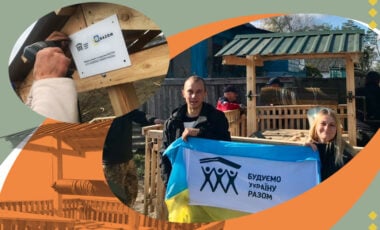Ukraine launches veteran services navigator

Фото ілюстративне
Lawyers from the Pryncyp human rights center have developed standardized service schemes for military personnel, veterans, and their families. Specialists consolidated all reference information regarding benefits and social services into a single guide. This directory, designed to be user-friendly, is available on the Pryncyp Legal Navigator website.
Anna Pashkina, a lawyer from the Pryncyp public human rights organization for servicemen, explained how veterans can use the navigator in the latest episode of the podcast Side by Side on Radio Nakypilo, as reported by Rubryka.
What is the problem?
Veterans returning from the front to cities, towns, or villages often face the same issue—a lack of accessible information about benefits, guarantees, and the processes for obtaining them. This conclusion was drawn by specialists at Pryncyp following their research on the challenges faced by veterans.
What is the solution?
Anna Pashkina explained that after engaging with veterans and social workers, the idea of creating a suitable guide emerged.
Experts who worked on the project found no significant difference between living in communities, large cities, or small villages. As a result, they developed a universal directory using schemes and algorithms that would be helpful for residents of various community types—rural, township, urban, and village districts.
"We realized the problem is that when a veteran reads the law, which might only have three sentences about certain guarantees written in complicated language, they don't understand what those guarantees mean, where to apply, or what documents are needed. Because of this, many simply forgo their benefits," the lawyer emphasized.
How does it work?
To access the guide, users can search for Legal Navigator Pryncyp in any search engine. On the site, they can select the relevant section based on their community type.
Once selected, users are presented with a simple diagram that outlines which government body to contact for specific issues, as well as where to find the addresses of these bodies. This includes information about registering veteran status, receiving benefits, guarantees, pensions, and various payments.
"We conducted specialized interviews and processed requests from various communities, receiving nearly 400 responses. However, I must remind you that this is not a universal, but a typical scheme. Not every village or city will have exactly the same system. This is just a general guide, but it tends to work in most places. Nonetheless, it's important to verify details locally," the specialist explained.
What's next?
Olha Borshch, Director of the Department of Social Protection of the Population at the Kharkiv Regional Military Administration, highlighted the new mobile app "Social Services of the Kharkiv Region," which includes a "Services for Veterans" section to help veterans access essential information.
"Our app features two main sections—social services and services for veterans. It also provides details on social service providers in the region's territorial communities, including addresses and operating hours of organizations where defenders and their families can apply for benefits and other social services," Borshch said.
The "Social Services of the Kharkiv Region" app was developed with inclusivity in mind. According to Borshch, the app has already been downloaded by 30,000 users, and a feedback form will soon be introduced as the next step in its improvement.
It is also worth noting that Sustainability Centers, based on the "Sustainability+" model aimed at family support, have been established in the territorial communities of Kharkiv. Additionally, veterans are working on creating an inclusive space for defenders in Blyzniuky, Kharkiv Region.


















































